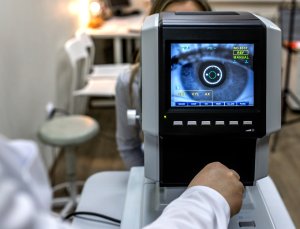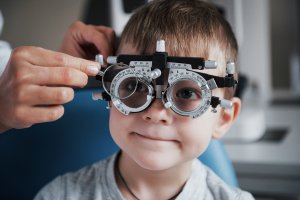Can Cataracts Come Back?

Voted Best of Berks—
eight years in a row!
Have you been thinking about cataract surgery? Our team at Eye Consultants of Pennsylvania gets asked some common questions. Can I have surgery on both eyes at the same time? How much down time will I have after surgery? Can cataracts come back? We will provide some answers in this article, but if you come in for a cataract consultation, our team will spend as much time as needed to make sure all your questions and concerns are answered.
Cataract recurrence
Once a cataract has been surgically removed, it cannot grow back. The cataract-affected lens is replaced with an artificial lens called an intraocular lens implant. Cataracts will not form on this new lens.
Some patients do experience blurred vision after cataract surgery. About one in five patients will actually experience this cloudy vision, but it is not caused by an actual cataract. Although the symptoms seem the same as the original cataract, it is caused by a simple condition. Patients can develop what is referred to as a secondary cataract, also called posterior capsular opacification. The capsule that supported the cataract becomes opacified. If this happens to you, our expert surgeons can do a quick and painless laser procedure right here in the office to treat that issue.
What is a cataract, exactly?
A cataract is a cloudy buildup that settles on the eye’s natural lens. With age, natural eye proteins break down as part of the aging process. Cataracts are not a disease, but a natural condition of aging. The protein breakdown forms on the lens, and these formations are what causes the cloudy or blurred vision. The proteins also cause light to scatter rather than focus on the lens, and this also contributes to vision problems.
There are several types of cataracts, named for their location on the lens. The most common one is called a nuclear sclerotic cataract that forms in the center of the eye.
Cataracts start out small, and most people don’t even notice vision changes at first. However, the protein deposits keep clumping onto the lens and pretty soon people begin experiencing vision issues. Our expert eye care team conducts several tests to correctly detect and diagnose cataracts. For patients age 65 or older, these tests are part of our standard, comprehensive eye exam.
While a small number of cataracts can be caused by radiation damage or steroid use, it is important to know that the large majority of cataracts are age-related. Most adults begin to notice cataracts between age 60 and 70, although some adults can begin to form cataracts as early as age 40.
How are cataracts treated?
To properly detect cataracts, we prefer to dilate your pupils to allow a more thorough examination of the eye lens. If you have mild cataracts, you may not need any remedy. We can also adjust vision prescriptions in the early stages of a cataract.
However, eventually surgery is needed because this is the only way to repair a cataract. We advise our patients to consider surgery when vision becomes significantly affected, such as night driving that becomes problematic. In fact, glare during night driving is the most common symptom reported by our patients.
Cataracts are very common. In fact, over 20 million Americans have them. Cataract surgery is the only treatment, and it is one of the safest procedures you can have. When the time comes for you to have surgery, our expert eye care team is here to answer all your questions like, “Can cataracts come back?” and so much more. We are ready for you to be our next patient, so give our Eye Consultants of Pennsylvania team a call day. Come visit one of our convenient locations.
Find a Doctor
Physician information including education, training, practice location and more.
Schedule an Appointment
Call 800-762-7132 or make an appointment online.





